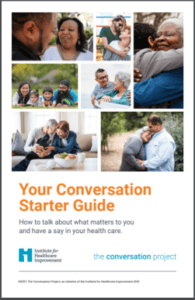Completing an advance care directive is a significant step in ensuring your healthcare wishes are honored if you cannot communicate them yourself. However, proactive steps are required to ensure your wishes are known and respected. Here are the essential next steps to take after completing your advance care directive.

If you don’t have an advance care directive and don’t know where to start, you aren’t alone. This article provides easy steps and free resources to help you get started.
Share Your Documents
Make sure that your advance care directive is not just filed away but accessible to those who need it. Provide copies to:
– Your designated healthcare surrogate or power of attorney
– Family members and close friends who might be involved in your care
– Your primary care physician and any specialists you see regularly
– Your local hospital, to be included in your medical records
Discuss Your Wishes
Having a signed document is vital, but so is making sure your loved ones and healthcare providers understand your wishes. Arrange a time to discuss the contents of your advance care directive with these important people.

If starting a conversation is difficult, we recommend this guide from The Conversation Project.
– Your designated healthcare surrogate
– Close family members and friends
– Your doctors, ensuring they understand and respect your choices
Review and Update Regularly
Your health, personal circumstances, and medical preferences may change over time. Set a reminder to review your advance care directive periodically, especially if you:
– Receive a new diagnosis
– Experience a significant change in your health
– Have a change in your family situation, such as marriage, divorce, or the death of a surrogate
– Have a change in other trusted relationships
– Simply change your mind about your healthcare preferences
Understand Your Document’s Scope
Ensure you and your surrogate fully understand what your advance care directive covers and any limitations it may have. For example, know the difference between a living will and other forms, such as the MOST form, which can offer more specific directives regarding medical treatments.
We’ve covered all these topics with a focus on Kentucky residents in this article.

Still haven’t started your advance care planning? You’re not alone. Find clear, easy steps here.
Prepare for Emergencies
In an emergency, your advance care directive should be easily accessible. Consider carrying a card in your wallet that indicates you have an advance care directive and includes the name and contact information of your healthcare surrogate.
Legal Considerations
Ensure your advance care directive complies with state laws. If you move to a new state, review your document to ensure it meets the new state’s legal requirements. Websites like Caring Info can provide state-specific information.
Completing your advance care directive is a crucial step in safeguarding your healthcare preferences. However, to ensure your wishes are understood and honored, share, discuss, review, and update your directives regularly. Taking these steps ensures that your advance care planning efforts effectively guide your care in the future, providing security and peace of mind for both you and your loved ones.
This document is for informational purposes only and is not intended to serve as legal or healthcare advice. You may wish to consult an attorney or a healthcare provider for guidance on advance care planning.
Hospice Care Plus was founded as a non-profit organization to support the quality of life of its communities through hospice, palliative, and grief care programs. The organization serves Estill, Jackson, Lee, Madison, Owsley, and Rockcastle counties and owns and operates the Compassionate Care Center in Richmond. Relying on contributions from individuals and groups, all care is provided regardless of insurance status or ability to pay. Make a gift, explore career and volunteer opportunities, or call 859-986-1500 to learn more.
Hospice Care Plus empowers those we serve to enjoy the highest quality of life, respecting their values, beliefs, needs, and goals through specialized care, education, resources, and grief support.
Our Service Area:
Our Home Hospice and Home Palliative Care programs serve you, wherever you call home, in the Kentucky counties of Estill, Jackson, Lee, Madison, Owsley, and Rockcastle.
Our inpatient care facility, the Compassionate Care Center, and administrative offices are located in Richmond, Kentucky.
Recent News:
News & Events

National Healthcare Decisions Day
National Healthcare Decisions Day (NHDD) is April 16. Hospice Care Plus is honoring the day by offering free resources to residents of our six-county service area to help individuals make and document their healthcare decisions. Lisa Knicely, the Director of Outreach Programs at Hospice Care Plus and the organization’s lead social worker, says NHDD reinforces…

Bourbon, Boots & BBQ May 5
UPDATE: We are officially SOLD OUT of reservations for the Bourbon, Boots & BBQ Derby Eve Party. Madison County’s longest-running Derby Eve party has reached its 20th year, and reservations are available now through April 28. The Bourbon, Boots & BBQ Derby Eve Benefit will take place Friday, May 5, at 6 p.m., at Churchill’s,…

A Night of Comedy for Hospice Care Plus
We’re excited to announce the first annual A Night of Comedy for Hospice Care Plus, featuring nationally known stand-up comedian and Kentucky native That Guy Joe Deuce. Joe has been named Funniest Comedian of Lexington and featured in his own stand-up special on Dry Bar Comedy, Amazon Prime, and YouTube. Join us on Friday, March…

We Are Now Centrally Located in Richmond
Yesterday was move-in day as we consolidated our Berea office with our Compassionate Care Center in Richmond. Now our home hospice program, home palliative program, bereavement care, and administrative staff are all located on the Center’s campus. “We made this decision as part of our strategic plan. It makes us more efficient, financially stronger, and…



